Vinokourov: I'm sure Nibali can win the Giro d'Italia again
Giro d'Italia Countdown: 4 days to go!
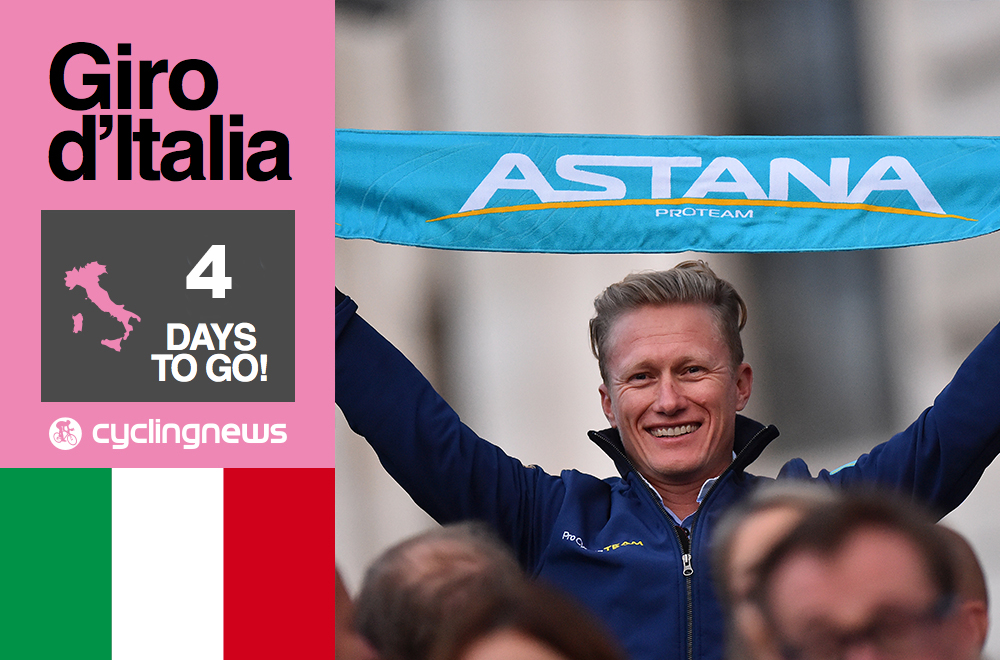
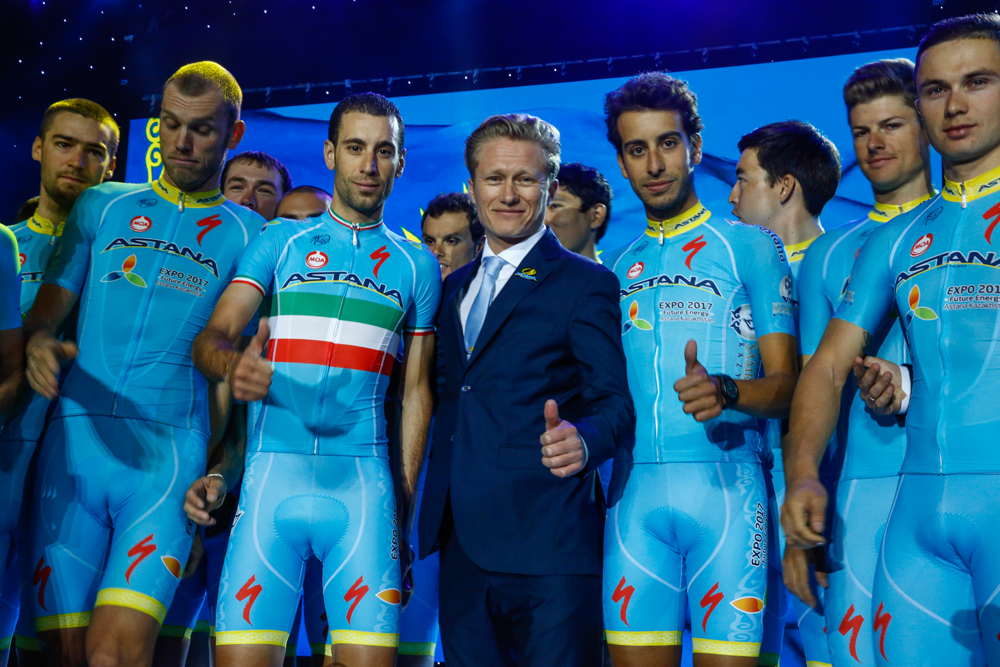
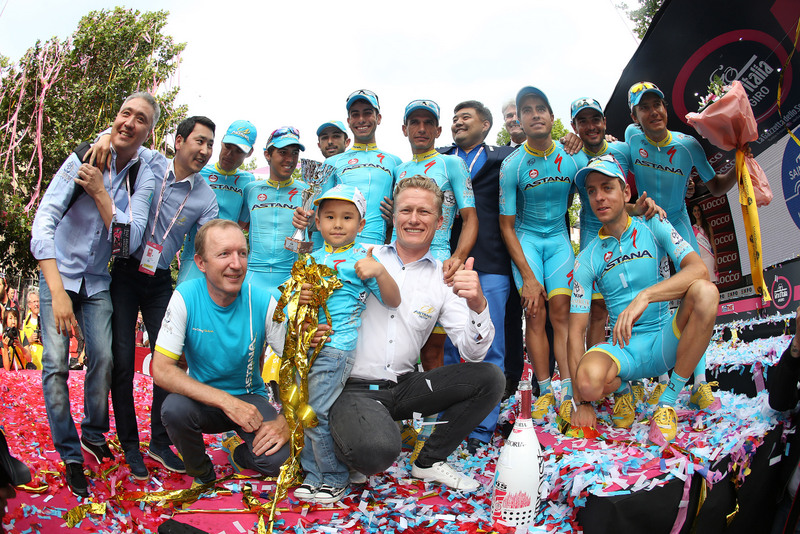
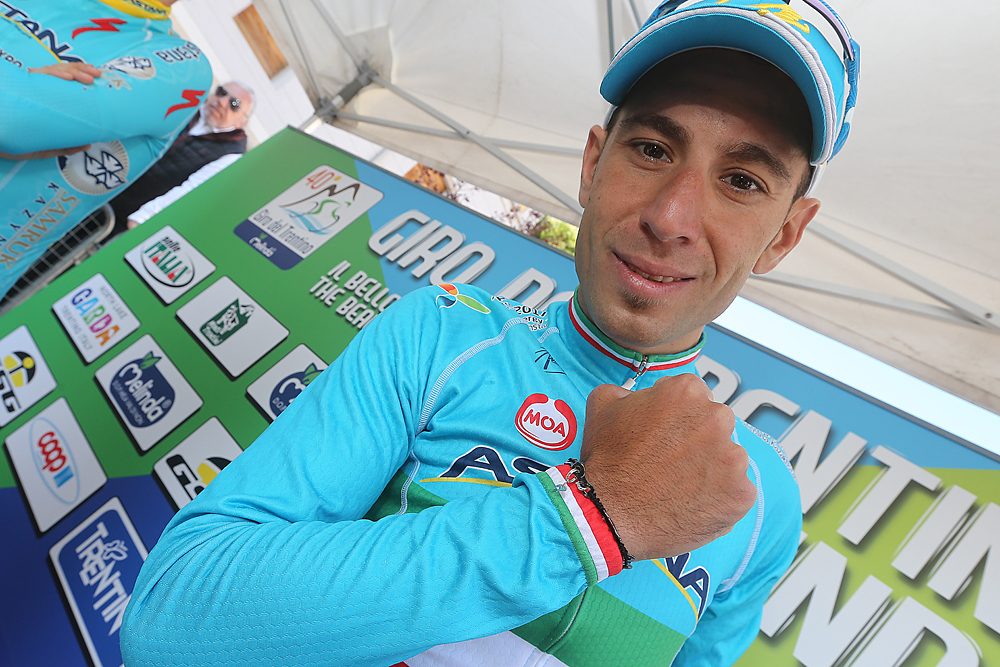
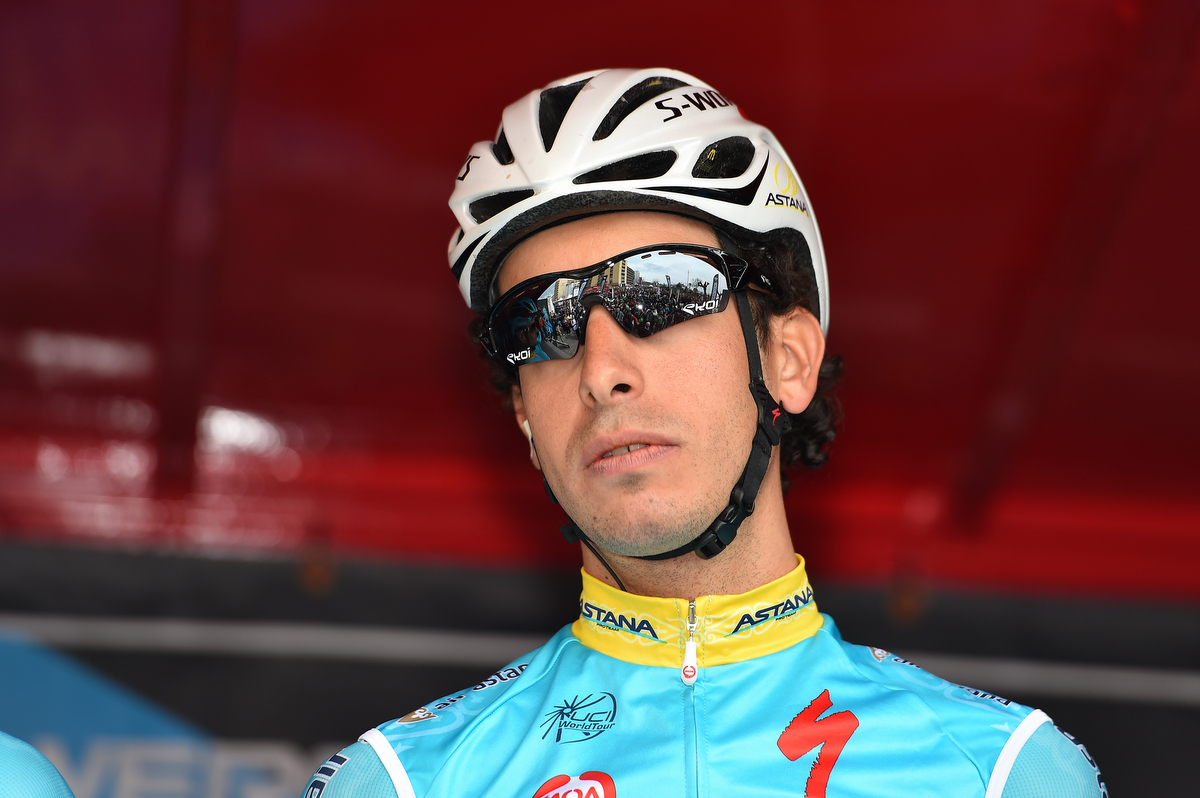
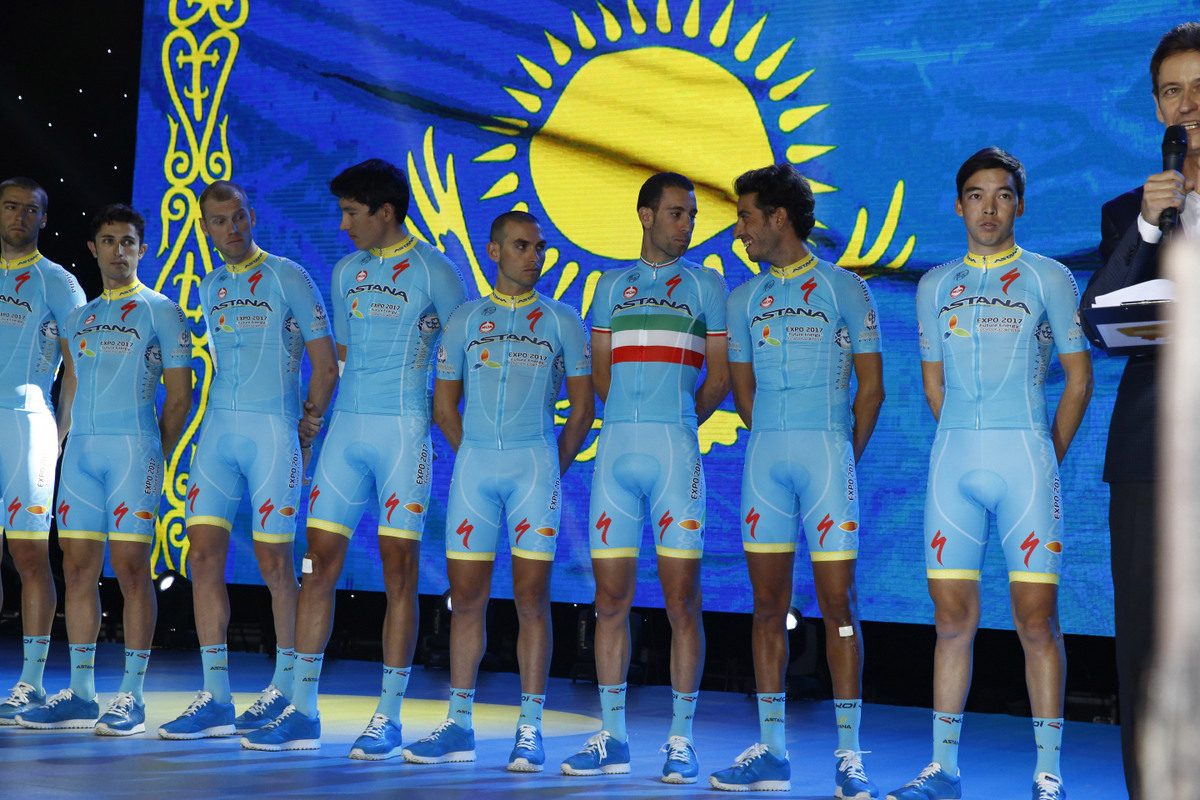
Alexander Vinokourov rarely gives interviews. He is a man of few words and cares little about what people think of him despite being in charge of Astana, one of the biggest team in professional cycling.
Vinokourov claims European press tried to destroy Astana team
Vinokourov denies he told Nibali to find a new team next year
Nibali says Vinokourov’s comments were designed to motivate
Vinokourov's lawyer 'negatively surprised' by comments of corruption charges in the press
Vinokourov almost certain Nibali will ride for Astana in 2017
Nibali and Aru test demanding Olympic Games course in Rio
Alexandre Vinokourov's special edition gold bike
Aru to skip Fleche Wallone and Liege-Bastogne-Liege - News Shorts
Nibali: Tactics, rivalry and how he'll win the Giro d'Italia
During the first part of his career as a rider he was admired for his aggressive style of racing but in 2007 he tested positive for a homologous blood transfusion during the Tour de France. Following his two-year ban Vinokourov defiantly returned to the sport in 2009 and won Liege-Bastogne-Liege for a second time in 2010.
A fractured femur during the 2011 season almost ended Vinokourov's career but he came back and won the gold medal in the road race at the London Olympics and then immediately announced his retirement. He used his success at home in Kazakhstan to secure full control of the Astana team, which is now in its tenth year and is targeting success at the Giro d'Italia with Vincenzo Nibali and at the Tour de France with Fabio Aru.
In this exclusive interview, Vinokourov talks about Nibali's chances of victory at the rapidly approaching Giro d'Italia; discusses the problems the Astana team overcame to hold its licence in 2015 and responds to those who question if he deserves a place as an important team manager.
Nibali, Aru and Astana's major goals for 2016
The Astana team has won 18 races so far this season but has always put far more importance on the Giro d'Italia, Tour de France and Vuelta a Espana. Vincenzo Nibali was off the pace at the recent Giro del Trentino but everyone at Astana insists that thanks to a big block of training at altitude, the Sicilian is set to peak for the decisive final week of the Giro d'Italia – his first goal of a busy summer than ends with the road race in the Rio Olympics in August.
Fabio Aru will focus on his debut at the Tour de France after winning the Vuelta in 2015. He had a steady start to the season but he hurt his back in a crash at the Vuelta a Pais Vasco, forcing him to miss Fleche Wallonne and Liege-Bastogne-Liege.
Get The Leadout Newsletter
The latest race content, interviews, features, reviews and expert buying guides, direct to your inbox!
Cyclingnews: How did you decide that Nibali would target the Giro and Aru the Tour?
AV: Vincenzo wants to win the Giro d'Italia again. He immediately asked to target the Giro after what happened last year at the Vuelta. He wanted to find new motivation and the Giro d'Italia is something for him to aim at. I'm sure Nibali can win the Giro d'Italia again. Then afterwards he can prepare for the Rio Olympics. That's another good goal for him because the course suits his aggressive style in hilly races. It'd be great for us if Vincenzo won gold and Alexey Lutsenko took the silver for Kazakhstan. That'd be perfect, I'd be super happy. The important thing is that the gold medal stays with the team after my success in London 2012.
CN: Will Nibali also ride the Tour de France with Aru? They don't seem to get on very well, they're almost rivals rather than teammates.
VN: After the Giro we'll see if Vincenzo rides the Tour de France or not. We'll decide together, all of us. Riding the Tour could be important to be ready for Rio. But if he wins the Giro and rides into Turin in pink, then perhaps things will change. Aru is the team leader for the Tour and Vincenzo knows that. But the Tour is crazy and doing it for the first time is even more difficult than the Giro and the Vuelta, so Nibali could help Aru on his debut.
CN: What are your hopes for Fabio Aru at the Tour de France?
AV: Were not going to the Tour just for experience or to win a stage or two. I think he can finish on the podium, for sure. Why not? For sure the Tour is different and harder to win that the Vuelta but he can get on the podium. I'm convinced that Fabio can fight with Froome, Contador and Quintana for a place on the podium. He's as strong as they are. The Tour is the Tour but the strongest always emerge.
CN: What's Aru like as a Grand Tour rider? How successful do you think he can become?
AV: He's definitely different to Vincenzo. Sardinia and Sicily are both Italian islands and not far apart but they're very different.
Vincenzo is easier to talk to, while Fabio is very determined, he knows what he wants. We saw that in the way he fought hard to win the Vuelta a Espana last year. The team was there for him but his character made a difference too. He showed his character at the Giro d'Italia too. He was ill in the last week in the mountains, but we talked and he fought back, winning two stages and finishing second behind Contador. That was a real sign of his character.
Of course Vincenzo is a campione too. He's a huge talent but perhaps he lacks a little bit of natural leadership during the races. He needs to raise his voice more in certain situations and take control of his riders to motivate and unite them behind him. Sometimes you've got to speak out to show that you're the leader but you also have to inspire your riders if you want them to ride 100 per cent for you. You can't just complain afterwards if you didn't speak out beforehand.
CN: Aru is under contract for 2017 but there have been reports linking Nibali to a possible new team from Bahrain but you've said you want him to stay with Astana. Is that true?
AV: We're negotiating with Nibali and his agent Alex Carera. For sure we want him to stay with the team. The global economy is not great and so he can't expect an astronomical contract, also because he's 30 now. We'll see what happens in the next few weeks. We want to work with him to help him win and be at 100 per cent for the Giro. That's the first goal. His future will become clearer after the Giro d'Italia.
A lack of contrition
Vinokourov doesn't like to talk about his positive test for blood doping from 2007 or doping in general. He simply doesn't think what happened is relevant to his work now as a team manager and is convinced he should be allowed to work in the sport because he served his two-year ban and made a successful comeback and won Olympic gold in 2012.
CN: Why did you want to become the Astana team manager? You probably could have retired and enjoyed life in Monte Carlo and Kazakhstan. Instead you are kept busy running a major team, you're often under fire for your own past and for doping problems in the team that almost cost the Astana team its WorldTour licence.
AV: Cycling is my life. I've done a lot in cycling and it's given me a lot too. I didn't just want to sit back on my sofa and enjoy life. I'm not like that. I wanted to be involved in the heart of the sport. Even if being team manager takes up a lot of time and means I have to be away from family and often go to Kazakhstan, it's worth it.
In August 2012 I asked President Nursultan Nazarbayev if he'd give me the honour of managing the Astana team. He immediately said yes. It's a great way to show off our young country and now to promote the 2017 Expo in Astana. We want to show the world what Astana and Kazakhstan is really like. We're also developing the next generation of Kazakhstan. We've got 10 Kazakh riders in the WorldTour team now and we've also got some track riders that we hope can perform at the Olympics.
CN: You perhaps know that a lot of people don't like you being a team manager or even being in the sport because of your 2007 ban for blood doping. What's your reaction to that sentiment?
AV: But I paid for my past…
CN: True but one of the problems for many people is that you never really apologised for what you did. Other people have seemed contrite and earned back respect for speaking out against doping.
AV: What do more do you want me to say? I made a mistake and I paid the price for that mistake. I was suspended for two years and then came back. And I was allowed to come back. I was like anyone who goes to prison; I paid my dues and now I'm allowed to be back. I think everyone knew or now knows what went on during my generation. I think it's widely accepted that everyone regrets it, including me. A lot of people were involved at the time and perhaps knew what was going on, from those who managed the UCI, to the different team managers, staff and the riders who were caught doping. After I was suspended in 2007 I sucked it up, kept quiet, served my ban and then came back to show that I could win clean.
CN: How do you respond to the people who criticise you, who perhaps don't want you in the sport?
AV: There's always going to be some parts of the public who are against you and even maybe angry with you; look what happened to Froome last year during the Tour de France. When you win there are always accusations against you. There are always people who are not happy that you won. I can only worry about myself and my team. My riders, staff and backers in Kazakhstan are happy to have me as their team manager. I'm allowed to be here under the UCI rules and so I intend to keep doing it.
I still feel young. I still keep fit. Indeed I've even started training for triathlons and hope to do an Ironman in the next couple of years. I'd be happy to be the Astana team manager for another ten years. The only thing that could change things is if I'm called back to Kazakhstan for the good of the country, then I'd go back.
Overcoming the problems of 2015
2015 was a difficult season for the Astana team and as a consequence for Vinokourov, after the UCI fought hard to suspend the team's WorldTour licence due to a series of doping cases in 2014. UCI President Brian Cookson told Cyclingnews that Astana was 'drinking in the last chance saloon'. However Astana made a series of changes to the way its riders and staff communicate, and managed to win its legal battle to stay in the WorldTour. Fabio Aru went on to win the Vuelta a Espana and Vincenzo Nibali won Il Lombardia after being expelled from the Spanish Grand Tour for holding onto a team car following a crash.
CN: 2015 was a very difficult season for the team, how difficult was it to keep the Astana team alive?
AV: Last year started off badly but I told the riders we had to stay motivated and we did. In the end we had an excellent season and a great end to the season with Fabio winning the Vuelta a Espana and Vincenzo winning Il Lombardia. Of course the WorldTour licence issues created some stress in the spring but we knew we had to stay united and stay focused because the security of everyone and their families was at risk.
It was all caused by two brothers (Maxim and Valentin Iglinskiy), who had a lot of problems themselves and then created problems for the team. They tested positive just like other riders in other teams have tested positive.
CN: But the UCI seemed to go to war against the Astana team.
VN: It's not right to say the UCI went to war against us but they put us under lot of pressure via the ISSUL (Social and Sports Sciences Institute of the University of Lausanne) and UCI Licence Commission. Fortunately the Commission did its job, investigated things carefully and confirmed that we had the right to keep our WorldTour licence. We also worked a lot with the ISSUL people, we improved the internal communications and lots of other things.
CN: How is your relationship with Brian Cookson now?
AV: We get on okay. We're not friends and we'd never go out fro dinner together but he's the President of the UCI and I respect his role. He started off his term as president pretty well and he's often at races, which I think is important. The UCI has a lot of problems to resolve but they seem to be trying to work on them. The problems with ASO are perhaps the most serious. Let's see how they resolve them.
CN: Is the future of the Astana team assured? Will you apply for planned three-year WorldTour licences that will start from 2017?
AV: We've still got to negotiate and finalise things with the Kazakhstan authorities but we should be able to carry on for another three years at least. Of course it's never easy to secure funding. This year we've had to cut our budget by 30% because of the fall in the price of oil. Our country depends a lot on the price of oil, like lots of other major countries and the Kazakhstan government covers most of our budget via major state companies. Other sponsors cover about 10-15% of the budget. I'm going to be around for a while yet and so is the Astana team.

Stephen is one of the most experienced member of the Cyclingnews team, having reported on professional cycling since 1994. He has been Head of News at Cyclingnews since 2022, before which he held the position of European editor since 2012 and previously worked for Reuters, Shift Active Media, and CyclingWeekly, among other publications.